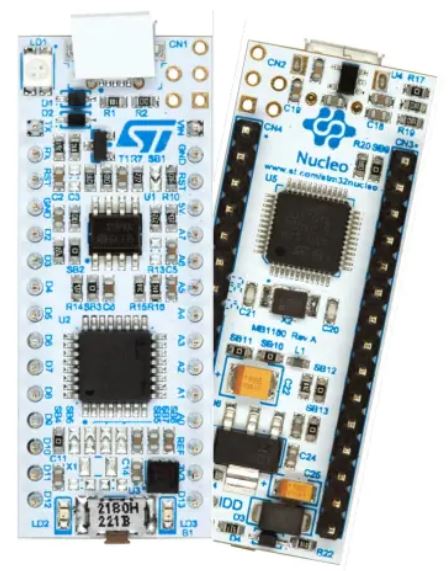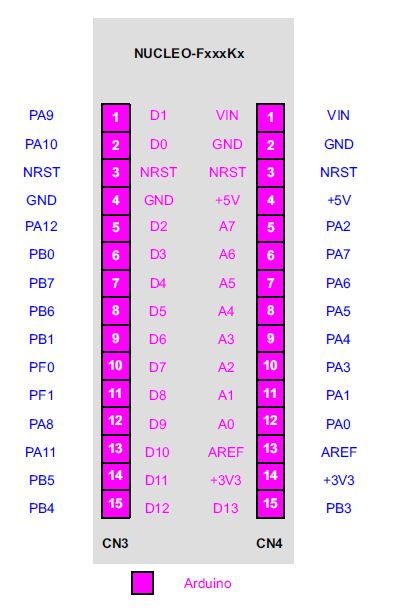ST Nucleo F042K6
Overview
The STM32 Nucleo-32 development board with STM32F042K6 MCU, supports Arduino nano connectivity.
The STM32 Nucleo board provides an affordable, and flexible way for users to try out new concepts, and build prototypes with the STM32 microcontroller, choosing from the various combinations of performance, power consumption and features.
The STM32 Nucleo board integrates the ST-LINK/V2-1 debugger and programmer.
The STM32 Nucleo board comes with the STM32 comprehensive software HAL library together with various packaged software examples.

More information about the board can be found at the Nucleo F042K6 website [1].
Hardware
Nucleo F042K6 provides the following hardware components:
STM32 microcontroller in LQFP32 package
On-board ST-LINK/V2-1 debugger/programmer with SWD connector:
Flexible board power supply:
USB VBUS or external source (3.3V, 5V, 7 - 12V)
Three LEDs:
USB communication (LD1), user LED (LD2), power LED (LD3)
reset push button
More information about STM32F042K6 can be found here:
Supported Features
The Zephyr nucleo_f042k6 board configuration supports the following hardware features:
Interface |
Controller |
Driver/Component |
|---|---|---|
NVIC |
on-chip |
nested vector interrupt controller |
UART |
on-chip |
serial port-polling; serial port-interrupt |
PINMUX |
on-chip |
pinmux |
GPIO |
on-chip |
gpio |
CLOCK |
on-chip |
reset and clock control |
FLASH |
on-chip |
flash memory |
I2C |
on-chip |
i2c controller |
SPI |
on-chip |
spi controller |
Other hardware features are not yet supported in this Zephyr port.
The default configuration can be found in boards/st/nucleo_f042k6/nucleo_f042k6_defconfig
Connections and IOs
Each of the GPIO pins can be configured by software as output (push-pull or open-drain), as input (with or without pull-up or pull-down), or as peripheral alternate function. Most of the GPIO pins are shared with digital or analog alternate functions.
Board connectors:

Default Zephyr Peripheral Mapping:
UART_1 TX/RX : PA2/PA15 (ST-Link Virtual COM Port)
I2C1 SCL/SDA : PB6/PB7 (Arduino I2C)
SPI1 NSS/SCK/MISO/MOSI : PA4/PA5/PA6/PA7 (Arduino SPI)
LD2 : PB3
For more details please refer to STM32 Nucleo-32 board User Manual [4].
Programming and Debugging
Applications for the nucleo_f042k6 board configuration can be built and
flashed in the usual way (see Building an Application and
Run an Application for more details).
Flashing
Nucleo F042K6 board includes an ST-LINK/V2-1 embedded debug tool interface. This interface is supported by the openocd version included in the Zephyr SDK.
Flashing an application to Nucleo F042K6
Here is an example for the Blinky application.
# From the root of the zephyr repository
west build -b nucleo_f042k6 samples/basic/blinky
west flash
You will see the LED blinking every second.
Debugging
You can debug an application in the usual way. Here is an example for the Blinky application.
# From the root of the zephyr repository
west build -b nucleo_f042k6 samples/basic/blinky
west debug